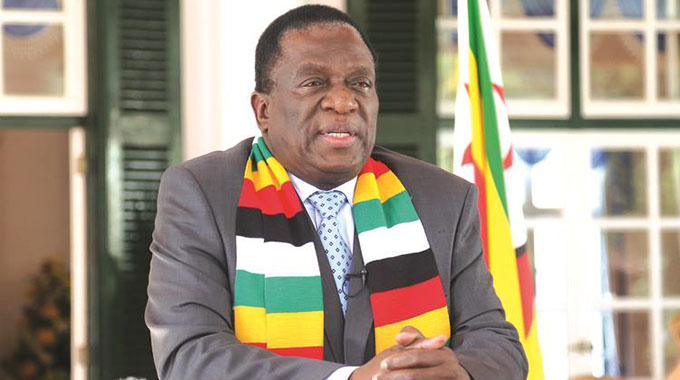Devolution takes shape in Mash Central

Fungai Lupande Mash Central Bureau
At the heart of Kanyemba in the northern part of the country, along the mighty Zambezi River, basins of its tributary Mwazamutanda hid the VaDoma tribe in its belly, popularly known as the two-toed tribe.
For ages, this unique tribe had little or no contact with the outside world maybe because of their cultural beliefs which made them hesitant to be in contact with fellow beings outside their habitat.
They literally became a forgotten tribe with little known of them with only a few with the slightest interest to know more about their way of life and incorporate them.
The train and wave of modernisation eluded this unique community as the country moved forward with developmental transformation.
Modernity escaped the VaDoma until the ushering in of the New Dispensation under the stewardship of President Mnangagwa.
The narrative of the VaDoma and many other marginalised communities in the country is indeed gradually changing as the Government implements devolution — a programme largely founded on the principle of empowering provincial government councils to spearhead economic and social development projects in individual areas by leveraging on local resources.
It is through devolution that the VaDoma are under the spotlight as the country witnesses the awakening of Kanyemba, the yesteryear Munhumutapa Empire captured in history books as the hub of ivory, gold, silver and cloth trading.
First Lady Auxullia Mnangagwa has made several trips to the VaDoma people in her spirited efforts to ensure they have access to health care services, education and food security.
Kanyemba has also played host to Vice President Constantino Chiwenga several times and a delegation of more than six Government ministers including RBZ Governor Dr John Mangudya among a host of dignitaries have all shown keen interest in changing the tide in the area
The area best described as the “dark city” because of its thick jungles and the absence of electricity will soon be electrified following advanced plans to import electricity from Zambia.
The layout plan of the town is not going to be ordinary following consultations by a provincial delegation in Victoria Falls and Kariba to take lessons from these towns, which share similar topography with Kanyemba particularly their proximity to the Zambezi River, wildlife and share similar climatic conditions.
Kanyemba is the first to complete a pontoon landing bay ahead of its neighbours in Mozambique and Zambia, a development set to facilitate trade amongst the three countries.
According to the layout plan, Kanyemba Border Post offers the shortest route into central Africa with a reduced distance of 600km compared to using the conventional Chirundu Border Post route.
Chapoto clinic, which is one of the few health facilities in the area is currently being upgraded to a hospital with the vision to confer Kanyemba town status by 2023. A special economic zone status has already been accorded to the area.
Behold, the giant is awakening. Devolution has stimulated economic activities and brought out the best in all districts in Mashonaland Central, particularly in Mbire district. Devolution promotes development, oneness, peace and stability.
It promotes sharing and tolerance of minority groups. It unites people in our diversity. Devolution was adopted as a critical element of the new Constitution of Zimbabwe of 2013 and is recognised as one of the Founding Values and Principles of the Constitution. Devolution is thus viewed as a necessary vehicle for getting rid of an over-centralised system of government in that it deepens democracy, promotes locally driven development, improves delivery of public services and enhances national integration and peace while recognising diversity.
It is devolution that has opened the doors for local authorities like Mbire and Mazowe Rural District Councils (RDC) to market business opportunities prevalent in their areas.
Mashonaland Central is endowed with vast minerals like gold, nickel chrome dolomite and the recent discovery of oil and gas in Muzarabani. The province is endeavouring to fulfil President Mnangagwa’s vision of an Upper-Middle Income national economy by 2030. A number investors have found value in investing in the province in different areas ranging from mining, housing development, solar energy development, agriculture and health care services.
Mbire Rural District Council chief executive Mr Claudius Majaya said they received an overwhelming response after hosting an investment conference in 2018.
He said the Government has vested interest in developing Kanyemba and this has resulted in the development of irrigation, tarring of Mahuhwe-Kanyemba road and the completion of the pontoon landing bay among other initiatives.
“The tarring of Mahuhwe-Kanyemba road is now at 7 kilometres and progress was stalled by Covid-19 pandemic,” said Mr Majaya.
“We managed to lure major investors among them Zimsun Hotel, Bindura University of Science Education and IBDZ.
“Devolution funds have enabled us to embark on a number of projects including construction of Mushumbi slaughter house, renovation of Gonono clinic and Gonono Primary School including the construction of two dip tanks.
“One of our challenges is lack of network connectivity in some areas in the district and transport challenges due to the bad state of the roads.”
Recently, Mazowe Rural District Council welcomed a US$1 million roofing tile investment with capacity to produce two metres of roofing tiles per second. This is one of the many investors ready to operate in the district, creating jobs for the local communities and bring in new technologies.
Following their investment conference last year, Mazowe Rural District Council chief executive Mr Liberty Mufandaedza said they received over one hundred investors and nine are geared to start operations.
He said the companies have a capacity to employ not less than 200. Some of the investors eyeing Mazowe District include Harare Institute of Technology (HITT) famed for innovation in appropriate technology.
However, Mr Mufandaedza said layout approval are taking too long and land is also another limitation.
Other rural district councils in the province are Muzarabani, Pfura, Rushinga, Bindura and Chaminuka might not have advertised themselves, showcasing their potential to investors but tremendous development is taking place.
Muzarabani gas and oil project by Invictus Energy was classified as a priority development initiative set to change the face of the district.
In Rushinga the local authority has come up with different economic initiative and they have received investors in dolomite mining and timber harvesting. Rushinga chief executive Mr Paradzai Munyede said their cattle market project at Chimhanda is proving to be successful and for three years now buyers have been coming from as far as Harare.
Their success story through devolution funds is the completion of Nyatsato clinic last year, a project approved in 2010 but was in the pipeline for nine years due to lack of funding.
“We started work at the Nyatsato clinic in 2013 but the projects were stalled due to financial constraints. Within a year after receiving devolution finds we managed to finish the clinic,” he said.
“The clinic in ward 22 has a coverage of 5 000 some from Mozambique and plans are underway to install a solar plant.”
Mashonaland Central Province’s story cannot be complete without mentioning the completion of Bindura-Shamva road within a year.
The 26 kilometre stretch had taken 26 years to complete but it’s now a marvel to drive on, thanks to devolution.










Comments